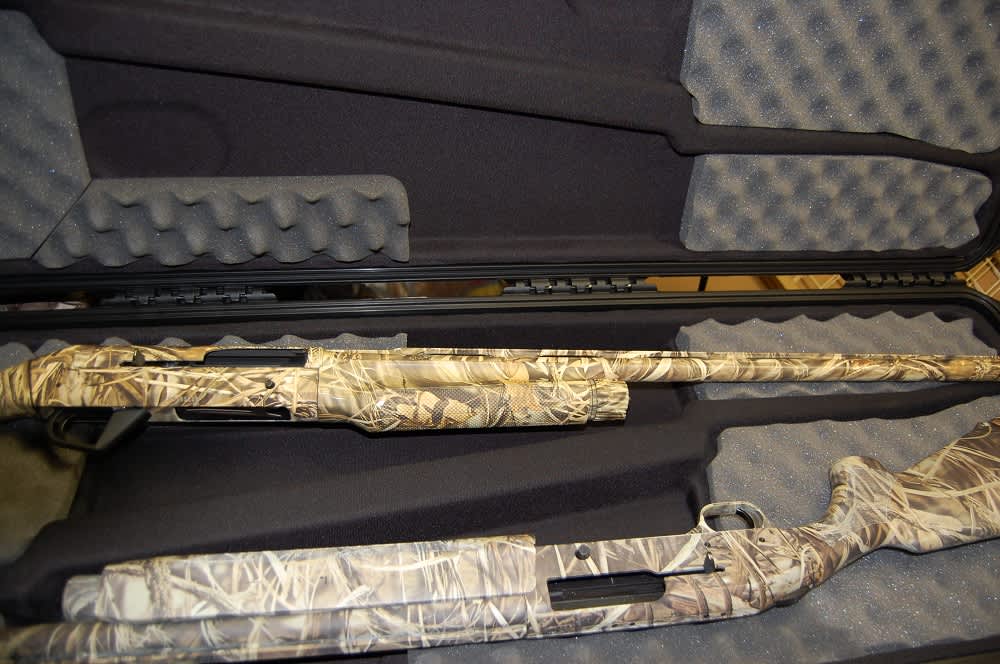Post-season Shotgun Care Tips
Hard Core Decoys 03.20.13

The season came and went. The fowl is in the freezer (hopefully) and maybe that one special bird is at the taxidermist getting prepared into a beautiful mount. You’ve got the gear stowed back in the closet and the shotgun is safely tucked away. You’re done with waterfowl hunting for the year.
But, did you take care of your shotgun? After the season is over, take care of your gun now to avoid problems later. There are a few things you can do to make sure your trusty gun is ready for another season.
Clean it
Give it a thorough cleaning, making sure to clean the bore and use the right kind of tools for the job. I like to use Tipton bore rods. They ride on ball-bearing drives so they are easy to use. Hoppe’s BoreSnakes are also awesome tools for cleaning. I use them in the field during the season and after the season is over, they make cleaning the bore a snap.
I wipe down all of the exposed metal surfaces of the gun with a good cloth and nice oil. There are a lot of good oils and cleaning solvents out there, but it’s hard to beat Hoppe’s stuff. Plus the smell just says guns to me. Maybe I’m just nostalgic. Hoppe’s, by the way, has been improved with a sweet synthetic blend that has all the advantages of newer synthetic cleaners, but it still smells like Hoppe’s No. 9.

If you’re using an semiautomatic shotgun, now is the time to strip it down and do a complete cleaning. I know some guns require several cleaning s throughout the year, but others don’t at the end of the season, all of my shotguns get a complete cleaning. Springs, ports, tubes, etc. all get a thorough exam for wear and damage.
And when you reassemble the shotgun, make sure you put the plug back in. One of my good buddies found out the hard way that thinking you have the plug in the gun and knowing are two very different and expensive things.
This is also a great time to make sure all the nuts and bolts are tight, and everything is where it should be. My guns don’t sit idle until next season, as I like to shoot at the range a lot. But if it did have something that sat for a while, it would be all too easy to forget that maybe I dropped the case on the last day of the hunt or something. Check everything now, just to be safe and give you less to worry about later.
Another really important step in the cleaning process is letting the gun sit in the warmth of the house for a while to make sure it gets dry. Condensation from cold weather can be a beast, getting rust-inducing moisture into parts of your gun you can’t see. Don’t be that guy.
One thing that will help is to not leave your gun in a case, sitting in the back of your closet all year. Even if you have a top of the line, weatherproof case that you’re certain will be perfect, this is a no-no. Let the gun breathe. Rust is the enemy. It’s even worse than a politician.
Keep a journal
You don’t have to be extensive about this, but it helps to know the temperature, range and weather conditions you shot your ducks in. Also, what ammo were you using? This will help you next season.
As you can guess, temperature affects metal and your gun is metal. If it’s cold, it’ll affect your gun and your future hunts. Was the temperature low? High? Was it windy? Keeping track of this kind of information will help you at the range the following season when you’re shooting a round or three and getting ready for another season chasing birds.
I also keep track of ammo. Sometimes ammunition manufacturers decide to stop producing a certain kind of ammo. It happened to me. I had one load that patterned awesome for ducks. I thought I had plenty of it, but was wrong. I was shocked and panicked when I learned they had discontinued it. Luckily there was a replacement that did well, but I was glad to have the information for a starting point.
It’s also good to take note of any setting or other modifications to the gun. If you have a shotgun with more than one barrel and you know you’re going to be using one for deer and other game, make sure you try to take note of where and how your slug barrel mounted to the receiver. It makes it easier to set it back up the following deer season.

Shoot it
The best thing I can tell you to do with your gun after season is to shoot it often. Shooting is fun and a great sport. Getting the gun out and shooting often not only makes you a better shot, but it keeps your muscle memory of the action of shooting fresh. I like to think of a shotgun as an extension of your body. Shooting often is just as much a part of off-season gun care as anything else you do.
Besides, shooting reminds you of the hunting season and makes those memories last just that much longer. How sweet is that? I, for one, love hunting and like to think that if I’m not hunting, I’m getting ready to hunt and therefore it is a year-round lifestyle, not just an occasional thing. Good hunting folks!

